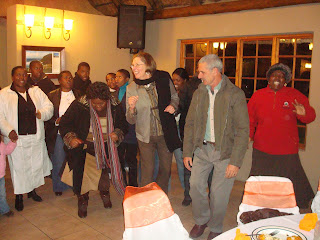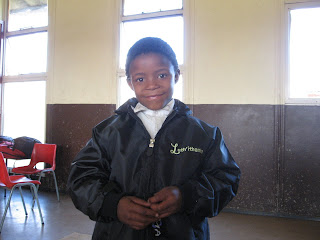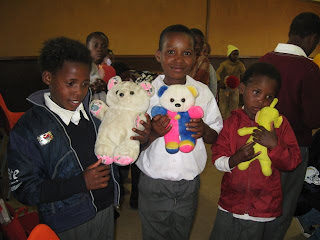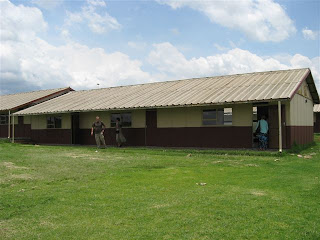My Peace Corps friend and I came to Zimbabwe to visit the Victoria Falls and my Zimbabwean friends. The falls were fantastic, the great Zambezi River spilling over a one-half mile long gorge that sent spray drenching us from our view point far up the ledge of the two hour long walk along the rim. I am told that Niagara Falls is a fraction the size of Victoria Falls. Maybe that is why Victoria Falls is called one of the "seven natural wonders of the world."
But the experience of the water falls is not what I took back with me to South Africa when we returned home. What will always stay with me was being a witness to the collapse of a country. My Zimbabwean friends in South Africa had shared with me over the past year their sadness and concern for family and friends left in their home country. But, until I saw it myself, it was difficult to fathom the crisis that has been unfolding in this beautiful country over the past seven years.
Meltdown in Zimbabwe….the policies of the country’s government, headed by Robert Mugabe, along with the increasing isolation and sanctions by the world community and with the exodus of the skilled and professional Zimbabweans to countries that can pay them a salary worth more than the paper it is printed on, have created a tragic freefall of the economy.
My friends took us on a tour for three days of open stores with nothing on the shelves and closed gas stations in towns and rural areas. We saw lines of people weave around shopping areas hoping that government shipments of mealie-meal would suddenly appear. The grocery stores must remain open per government dictate yet what I saw on the shelves was not the staple foods required for life in Zimbabwe such as mealie-meal (corn meal), flour, cooking oil, soap and salt, but, instead, I saw dog food, cheap distilled spirits and Special K cereal. There was no milk, no meat of any kind, no bread, not even bottles of CocaCola which seems to be a dominate feature in all of the African countries I have visited. It was an appalling sensation to realize that if a Zimbabwean had no means to access food from the neighboring countries of Botswana or South Africa, or did not have a vegetable garden or field planted with mealies (corn), starvation could likely occur. I was told in the rural areas, people have already resigned themselves to eating one meal a day and there are reports of starvation. The government refuses to allow foreign journalists into the country to chronicle this disaster. I was advised not to take photographs of these scenes because the government has security officers ready to detain those attempting to reveal these conditions. People were fearful to discuss politics because of the climate of intimidation.
When I visited Victoria Falls as a tourist, I had difficulty spending my money…..? I could not access cash by an ATM (and even if I could, I wouldn’t have wanted Zim dollars). I could not use credit or debit cards as the "official" conversion rate was prohibitive. In order to obtain more cash in dollars, I had to pay a 15% charge in a lovely air-conditioned, hi-tech office. Business is done on the black market using US dollars or South African Rand. To convert one US dollar to one Zim dollar, I was offered between 1,200,000 and 1,600,000 Zim dollars depending on the day. The bulging pants pockets of Zim dollars are practically worthless. Four small apples cost $2,000,000 Zim dollars. Zimbabwe’s inflation rate is the highest in the world.
Have you ever wondered what it would be like to live your life without any fuel except for fire wood? The only way for a Zimbabwean to travel in his own country is to bring gasoline with him from Botswana and South Africa or buy it from the black market at an exorbitant rate ($60US to travel 130 miles). My friend stores 25 litre plastic containers in her bathroom filled with gasoline. As we drove 65 miles from one town to the next, I counted on one hand the number of cars with Zim license plates that we passed. And the other handful of cars we passed hailed from neighboring countries. And this occurred on a national highway.
And, yet, the Zimbabwean people persevere with a strength and morality that is amazing under such tremendous stress. There is negligible crime in Zimbabwe. We left our cars unlocked and anyone can walk the streets at all times…..very unlike South Africa. The people we met were friendly, generous with their helpfulness and kind….. I wonder what the future holds for Zimbabwe. I hope for a change in government and a willingness by the global community to step in and help. But, for the time being, keep the Zimbabwean people in your prayers.












































